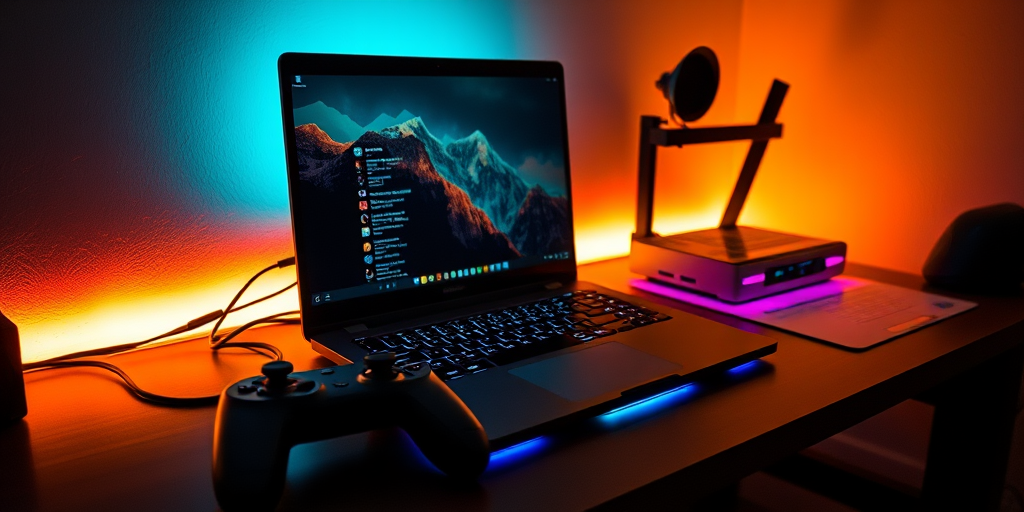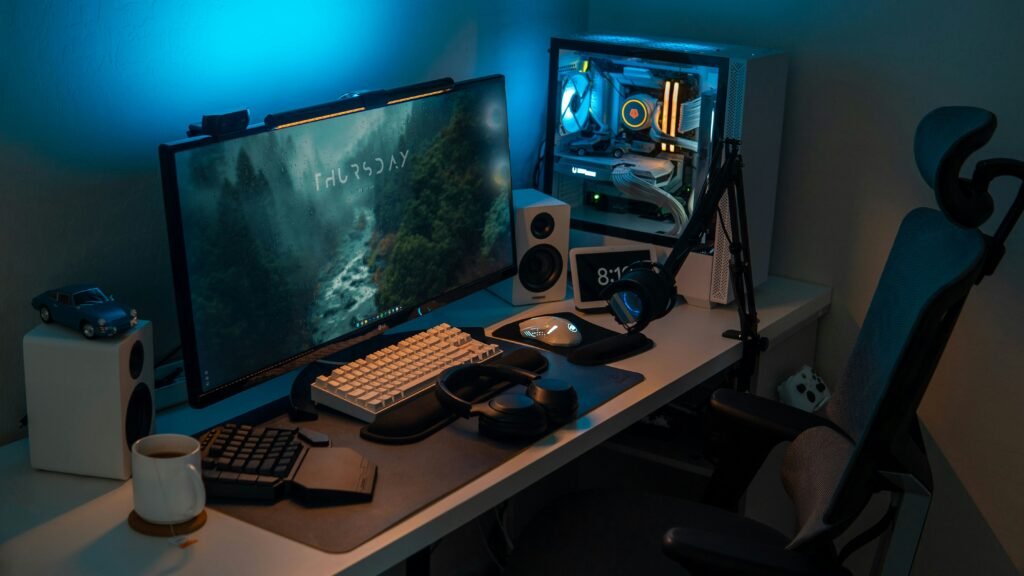Ever wonder if you can blend competitive performance and budget-friendly pricing in a starter gaming laptop? We believe it’s not only possible but essential for novice gamers aiming for a smooth transition into high-intensity gaming.
In our guide, we dissect key criteria—from CPU efficiency to entry-level GPUs—and highlight models like the HP Victus 15, Acer Nitro 5, and Lenovo Loq 5 as benchmarks for affordable power. Join us as we uncover the secrets behind achieving incredible value without compromising on the gaming experience.
In-Depth Reviews of Starter Gaming Laptops

We begin our review by focusing on the criteria vital for evaluating a starter gaming laptop. Our selection emphasizes models that merge processor performance, display quality, efficient thermal management, and an affordable price tag. We scrutinize each laptop’s key features, ensuring that performance benchmarks such as CPU speed, GPU capabilities, and cooling efficiency meet the rigorous demands of casual gaming.
Our evaluation includes systems like the HP Victus 15 and Acer Nitro 5, each offering competitive graphics and reliable processing power for an entry-level experience.
Our selection also considers design factors and user feedback. We analyze models through dual lenses: technical specifications and real-world usability.
The HP Victus 15, Acer Nitro 5, and Lenovo Loq 5 represent devices that balance modern hardware configurations with design nuances suited for prolonged gaming sessions. Meanwhile, MSI Thin GF63 and Asus Tough Gaming A15 demonstrate portability and durability, each providing enhanced cooling systems and optimized features for competitive digital play. We base our analysis on expanding user feedback and comprehensive testing across various performance metrics.
When comparing these models, we notice trade-offs between design elegance, performance sustainment, and pricing. The HP Victus 15 stands out with its adaptive sync and robust processing elements, while the Acer Nitro 5 attracts buyers with its streamlined cooling and cost efficiency. The Lenovo Loq 5 introduces innovative controls through its AI engine but contends with minor thermal noise issues. MSI and Asus offer further portability and durability; however, each has its unique performance quirks that can influence overall value.
| Model | Key Specifications | Price Range | Noted Pros & Cons |
|---|---|---|---|
| HP Victus 15 | 15.6″ FHD, 144 Hz, 13th-gen Intel, RTX 3050, adaptive sync | Mid-range | Balanced performance; limited upgradeability |
| Acer Nitro 5 | 15.6″ IPS FHD, 144 Hz, 12th-gen i5, dual fan cooling | Budget to mid-range | Competitive pricing; design quirks |
| Lenovo Loq 5 | 15.6″ FHD, 144 Hz, AI engine, MX switch | Mid-range | Innovative features; noisy fans under load |
| MSI Thin GF63 | 15.6″ FHD, 144 Hz, portable design, enhanced cooling | Mid-range | Portability-focused; potential performance drop |
| Asus Tough Gaming A15 | 15.6″ FHD, 144 Hz, military-grade durability, dual fans | Budget to mid-range | Durable build; limited screen brightness |
Our comprehensive review aggregates key performance indicators and user insights to help you navigate the landscape of starter gaming laptops. These evaluations underscore the inherent trade-offs between performance enhancements and cost efficiency, ensuring that you can select a unit that meets your digital play demands without compromise.
What’s a Good Starter Gaming Laptop: Incredible Value
When researching a starter gaming laptop, we begin by identifying our personal gaming needs and performance benchmarks. We consider factors such as battery life, keyboard responsiveness, cooling performance, and overall design ergonomics.
Precise evaluation of these aspects ensures the chosen device can handle prolonged gaming sessions while meeting everyday usage requirements. Our analysis draws from extensive reviews of popular models from HP, Acer, Lenovo, MSI, and Asus.
Understanding that different devices offer varying strengths, we examine specifications and user feedback to match a laptop to individual gaming expectations. For instance, devices with robust cooling systems may counterbalance potential drawbacks like low battery life or soft keyboard feedback.
When asking the core attributes of a good starter gaming laptop, the answer is clear: a device must balance performance, durability, and affordability, ensuring a solid foundation for beginners that can also support future upgrades.
- Define your budget and gaming expectations
- Compare technical specifications across models
- Read user reviews and expert opinions
- Consider potential upgrade paths for future-proofing
- Finalize your choice based on the best price-performance ratio
By following these steps, you can methodically narrow down options and align them with specific gaming needs. Weighing pros and cons such as design efficiency against potential hardware limitations or connectivity trade-offs enables us to decide on a system that not only delivers immediate performance but also offers a clear upgrade path as future software and hardware demands evolve.
Final Words
In this post, we have dissected key performance benchmarks, hardware specifications, and model comparisons. Our analysis covered essential aspects such as CPU performance, display clarity, GPU handling, and adequate cooling efficiency.
We provided comparative insights to help evaluate budget-friendly models while addressing upgrade potential and long-term durability.
If you’re wondering what’s a good starter gaming laptop, our guide presents clear criteria and actionable benchmarks to empower a confident decision.
Move forward with clarity, as you embark on your gaming journey with both precision and optimism.
FAQ
Q: What is a good price range for a starter gaming laptop?
A: Entry-level gaming laptops typically range from $800 to $1,200. This price range offers adequate performance with modern processors, dedicated GPUs, and sufficient RAM for current games.
Q: What are the minimum specifications needed for a gaming laptop?
A: A starter gaming laptop should have at least an Intel Core i5/AMD Ryzen 5 processor, 16GB RAM, NVIDIA GTX/RTX graphics card, 512GB SSD, and a 1080p display with 144Hz refresh rate.
Q: Which brands offer reliable budget gaming laptops?
A: HP Victus, Lenovo LOQ, Acer Nitro, and ASUS TUF series provide dependable budget gaming laptops. These brands balance performance, durability, and affordability with good customer support.
Q: What features should I prioritize in a starter gaming laptop?
A: Focus on graphics card quality, processor speed, cooling system efficiency, display refresh rate, and RAM capacity. These components directly impact gaming performance and overall experience.
Q: How important is the display in a gaming laptop?
A: A gaming laptop’s display is crucial. Look for 1080p resolution minimum, 144Hz refresh rate, and adaptive sync technology for smooth gameplay without screen tearing.
Q: Can budget gaming laptops run modern games?
A: Yes, modern budget gaming laptops can run current games at medium to high settings. Models with RTX 3050 or better GPUs handle popular titles effectively at 1080p resolution.
Q: What storage type is best for a gaming laptop?
A: SSD storage is essential for gaming laptops. A 512GB NVMe SSD provides fast load times and sufficient space for multiple games. Consider models with additional storage expansion options.



